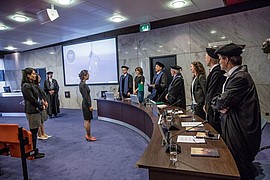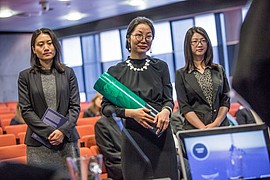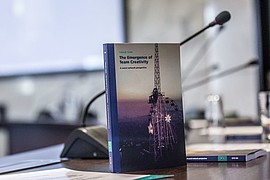PhD Defence: Yingjie Yuan

In her dissertation ‘The Emergence of Team Creativity: A social network perspective’, ERIM’s Yingjie Yuan challenges the assumptions of the additive model, where individual team members contribute equally to team creativity.
Yingjie Yuan defended her dissertation in the Senate Hall at Erasmus University Rotterdam on Thursday, 21 September 2017 at 11:30. Her supervisor was Prof. Daan van Knippenberg and her co-supervisor was Dr Daan Stam. Other members of the Doctoral Committee are Prof. Steffen Giessner (Erasmus University), Prof. Stephen Humphrey (Pennsylvania State University) and Dr Anne Nederveen Pieterse (Erasmus University).
About Yingjie Yuan

Yingjie Yuan (1987) was born in Shishou, Hubei, China. She joined ERIM and started her Ph.D. at Rotterdam School of Management in 2012 and was a visiting Ph.D. at Pennsylvania State University in 2015. Before that, she obtained a Master of Science Degree from the Renmin University of China, China, majored in Organizational Behaviour. Yingjie also holds two Bachelor’s degrees in Information Management (major) and Economics (minor) from Wuhan University, China. Currently, she is an Assistant Professor of Human Resource Management & Organizational Behaviour at the University of Groningen, the Netherlands.
Yingjie’s research lies at the intersection between team creativity and social networks in organizations. Her dissertation examines the emergence of team creativity from the composition of individual creative sources embedded in network structures. She presented her research at various international conferences including the Academy of Management, Interdisciplinary Network for Group Research, International Network for Social Network Analysis, and International Association for Chinese Management Research. Her word is currently under review at important management journals.
Thesis Abstract

To overcome complex and dynamic economic challenges, organizations increasingly employ teams and build their competitive advantages on the inimitable capital of creativity. Naturally, when and how individual inputs combine to form team outcomes has therefore become one of the core questions in developing creativity theories. For years, empirical studies have been based on the assumptions of the additive model, where individual team members contribute equally to team creativity. This dissertation challenges this assumption in different ways. In the first empirical chapter, I provide evidence for an alternative model, the disjunctive model, which predicts team creativity based on the creative performance of a team’s most creative member, and shows under which conditions this most creative member’s inputs are adopted and contribute to team creativity. The second empirical chapter meta-analyses the validity of both the additive model and the disjunctive model, and finds support for both across different contexts. The third empirical chapter extends the focus from a team’s creative performance to a team’s general performance, and uses a social network perspective to examine how the ‘disjunctive’ role of team leaders promotes team performance. The core contribution of this dissertation lies in supporting the predictive power of the disjunctive model of team creativity, thereby challenging mainstream research on team creativity which undervalues the importance of key team members and their surrounding subgroups. A contingent perspective on both additive and disjunctive models is proposed.
Photos: Chris Gorzeman / Capital Images


